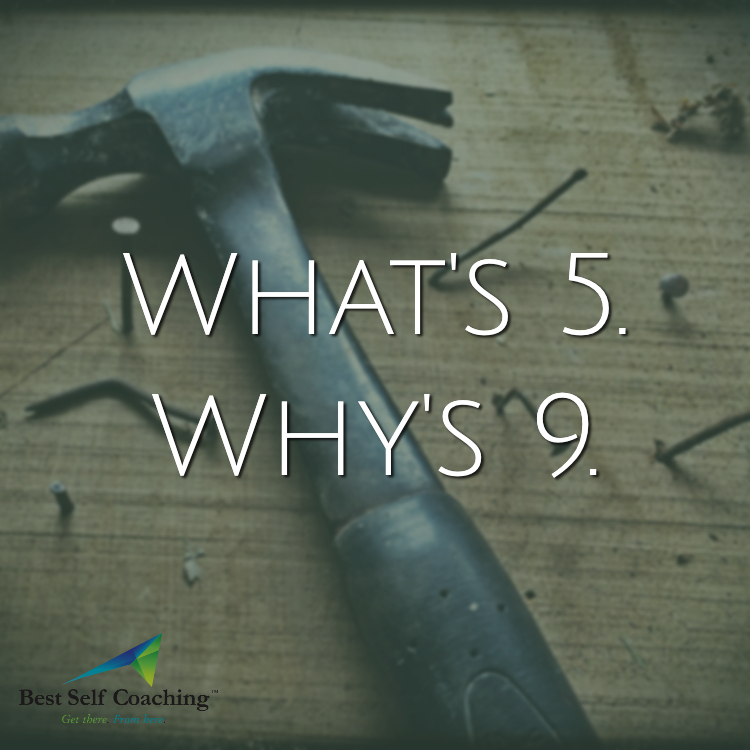You’re right. There are no question marks in that title.
In the world of leadership development, self-development, and business development, we are charged with discovering and improving our circumstances relative to any of those disciplines. That is to say, if you are working on yourself, you have to actually ask yourself questions to diagnose your issues and then subsequently ask the questions that will help you solve those issues. Make sense? To develop means to “grow, evolve and mature”. Those things cannot happen without the above-noted triage.
Here’s the rub: The questions you ask are even more important than the answers. So much depends on them, that if they are the wrong questions for the particular circumstances, your efforts will be derailed before you even get started.
For example, if I pose a question that begins with “Why”, we are likely to get to the core causes behind an issue, right? And if we ask “Why” five times, as Eric Ries advises in his book, The Lean Startup, we will get to the root of the problem more quickly and more effectively. EMyth and others have been successfully going meta for years.
So, what’s wrong with “Why?” It depends on when you use it. If I ask my teenager “Why did you feel the need to stay on your phone until 1:00 AM?”, I am likely to be met with defensiveness. It cuts so deep to the core issue that he is not ready for it. The truth is, he’s impressionable with his peer group, and discovering new and exciting ways to engage with them about adult topics, and the safest time to do that is when everyone else is asleep. I don’t think that’s an analysis he will appreciate. So “Why” is not the best entrance into the conversation.
It’s in these circumstances that I should turn to a different question, such as “What?”
“What should you be doing at 1:00 instead of texting, so you can wake up in a better mood”? It goes straight to a solution-based conversation. It doesn’t highlight his still-emerging adolescent self. Rather, it assumes he knows better about what he should be doing, encourages him to do it, and then leaves the choice with him. He’s no longer “in the question”, and that is alright with him!
The same applies to all of the clients I work with. Some of the business owners I work with need to be prodded and challenged with the stronger questions.
“Why do you suppose you have avoided making a budget for the year, until June?” Because I hate the finance part of my business.
“Why do you hate the finance part of your business?” Because it’s complicated and I don’t fully understand it.
“Why haven’t you learned it yet – being 52 years old and a business owner?” Because I don’t like what it will tell me.
“Why won’t you like it?” Because it will put restrictions on how I should be spending my money.
“Why don’t you like those restrictions?” Because money represents freedom to me, and I don’t like that to be shackled.
Do you see where we are going? Here’s the ineffective alternative:
“What is the best way to understand where your money is coming from and where it’s going every month?” A budget.
“Right. Get on that!” Okay.
The problem with this, however, is nothing is being done to address the root problem. My client is not a fool. She understands what the best tool is. And it’s likely she will still avoid the task of making a budget. Until she understands what the barrier is, she cannot confront it and she cannot correct it.
Accountability is rarely black and white. It’s usually a subtle shade of grey, depending upon who the subject is, what the issue is, how much trust exists, and many other factors. So on a scale of 1 – 10, let’s say being fully permissive is a “1”, and blameful ownership is a “10”. If you ask a “What” question, you’re landing right around the “5”. If you ask “Why”, you are closer to a “9”. One is a poke, and the other is a hammer.
Depending upon who you are working with, the level of engagement will vary greatly. Some of my clients can go straight to “Why”, while others require a slow evolution to the meta and need to start with “What” or “How”. And that’s okay. Go with what works here.
Please share with me how this did or didn’t work for you with your own tribe.

